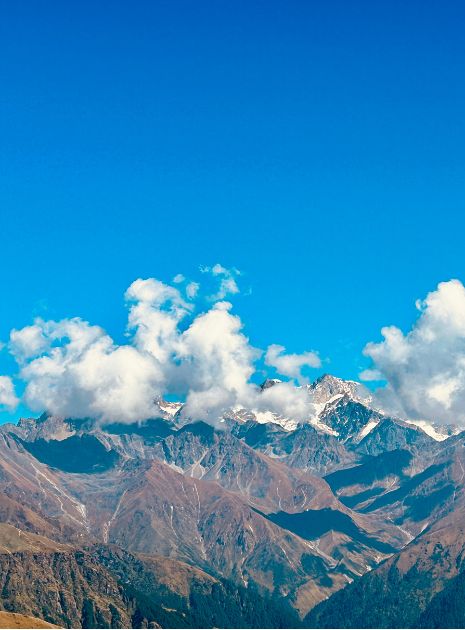Haridwar
Maybe it’s restlessness. Maybe it’s grief. Maybe just the need to stand still. And in Haridwar, standing still doesn’t feel like doing nothing. It feels like listening. To the river. To the bells. To the parts of yourself you’d forgotten.
You don’t arrive in Haridwar with a list. You arrive with a feeling.
Maybe it’s restlessness. Maybe it’s grief. Maybe just the need to stand still. And in Haridwar, standing still doesn’t feel like doing nothing. It feels like listening. To the river. To the bells. To the parts of yourself you’d forgotten.
There’s something old here that doesn’t need to announce itself. The city doesn’t pretend. It doesn’t sparkle to impress you. It breathes like it has for centuries, slowly, steadily. And you fall into its rhythm without trying.
You wake up early, not because you set an alarm, but because the air itself stirs you. There’s smoke outside your window, the kind that carries the scent of burning wood and something warm. Maybe a morning aarti (आरती) just ended. Maybe someone’s lighting their stove.
You step out, still half-asleep, and the road is already alive. Not noisy. Just moving. A man is setting up his stall with steel thalis. Someone is slicing raw papaya for chaat. The ghat is closed. You can hear the river before you see it.
The Ganga doesn’t rush. She moves with purpose, but softly. Cold. Wide. Unapologetically herself.
You sit on a stone step, sip chai, and just watch the water go by.
There’s no itinerary here. You start walking, and the road decides for you. You pass an old sadhu sitting cross-legged with a chillum. He looks up once and then looks away. Not with disinterest. Just with peace. Like he knows you’ll understand when you’re ready.
At Har Ki Pauri, the steps are worn smooth by bare feet. You notice people touching the stone gently before sitting. Some sit in silence. Some cry without hiding it. A few take a quick dip, shivering, lips murmuring prayers only the river understands.
Small Things Feel Bigger Here. A girl unties a pink thread from her wrist and drops it into the water. A little boy with sindoor (सिंदूर) on his forehead asks his father why humans throw plants. The father doesn’t answer right away. He just smiles and hands him a marigold.
You notice a kalash (कलश) placed neatly beside a man’s slippers. He folds his hands, then touches the water with his fingers, as if greeting someone familiar.
Every gesture is simple. Yet full. Haridwar doesn’t explain itself. It just shows you how much meaning can live in the smallest acts.
You find a stall near the lane behind the temple. No name. Just a man flipping aloo puris in a wok full of ghee (घी). He sees you standing and offers a plate without asking anything.
The puris puff up like tiny balloons. Crispy, golden. The aloo is soft, a little spicy, but not fiery. Just right. You eat standing up. No napkin. No garnish. And yet, it tastes like the kind of comfort that doesn’t need fixing.
Later, you sip a kulhad (कुल्हड़) of hot milk dusted with crushed pistachios. You didn’t even know you were craving it. You walk slower after that.
You reach the ghat again before sunset. The steps are filling now, but it doesn’t feel crowded. It feels expectant. Like the river and the sky, the people are all waiting together.
Someone lights a small lamp and sets it afloat in the water. Then another. Then dozens.
The aarti begins, not with spectacle, but with sound. Bells. Conch shells. Voices rising together. The priests raise brass lamps, the flames circling wide and high. The light flickers on faces some in prayer, some in awe, some just watching.
You don’t need to know the chants. The rhythm carries you. And just like that, something inside you softens.
The walk back from the ghat is quiet, even though the town is still alive. Shops are open. People are eating. But no one’s loud. It’s like everyone knows they’ve just been part of something that didn’t need words.
You stop to buy a rudraksha bracelet, not for luck. Just because the man selling it reminded you of your grandfather, you say thank you, and he doesn’t say anything back. Just nods.
You pass an old house with a flickering yellow light in the window. A girl inside is plucking tulsi (तुलसी) leaves into a bowl. You keep walking, but you carry the moment with you.
You wake up early again. The air is cooler. The river sounds the same. You pack quietly. Not because you’re in a rush. But because you feel ready. Or close to ready.
You stop at the ghat once more. Just to sit. Just to watch. You touch the water. Cold. Steady. You don’t pray. You don’t ask for anything. You just listen. And maybe that’s a kind of prayer, too.
When you walk away this time, the road feels lighter under your feet. You don’t look back. You don’t have to.
Haridwar doesn’t ask you to remember her. She already knows you will.
| Bhagwanpur | Laksar | Laldhang |
| Narsan | Roorkee |
| All Districts | ||
|---|---|---|
| Nainital | Chamoli | Almora |
| Haridwar | Champawat | Rudraprayag |
| Udham Singh Nagar | Uttarkashi | Pithoragarh |
| Bageshwar | ||

Uttarakhand is not simply another country. People here name it Devbhoomi (देवभूमि), the Land of the Gods. And it feels that way. Rivers begi...
| All States |
|---|